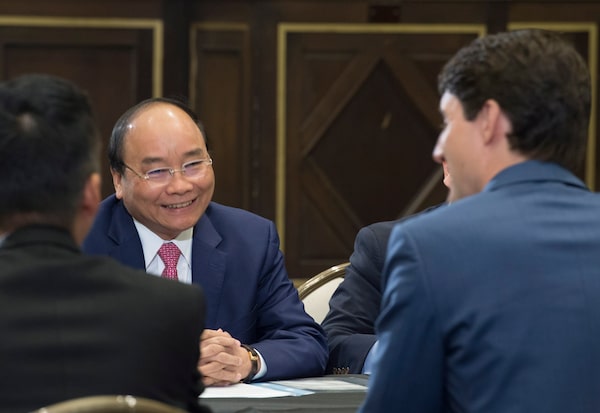
Prime Minister Justin Trudeau, right, meets with the Prime Minister of Vietnam, Nguyen Xuan Phuc, during a meeting as part of the G7, on June 10, 2018 in Quebec City, Que.Jacques Boissinot/The Canadian Press
There has been a lot of angst in Canada about the so-called “China clause” in the country’s recently negotiated trade deal with the U.S. and Mexico.
Under the proposed U.S.-Mexico-Canada Agreement, or USMCA, any country can quit the deal on six-months notice if another member enters a separate trade pact with a “non-market country.”
Prime Minister Justin Trudeau and other top Canadian officials insist the clause will in no way limit its ability to pursue a free-trade deal with China.
Other trade experts see something more ominous – a potential U.S. veto over how Canada and Mexico conduct trade policy in the future. The U.S considers China a non-market country, arguing that export subsidies, foreign investment restrictions and the activities of its state-owned enterprises badly distort how prices are set in the country.
Well, guess what? The U.S. also brands Vietnam a non-market economy. And Canada recently ratified a major new trade agreement with Vietnam and 10 other Pacific Rim countries – the Comprehensive and Progressive Agreement for Trans-Pacific Partnership (CPTPP). Mexico is also a signatory of the trade pact.
So, surely, if the Americans had a problem with non-market countries, Canada would have got an earful from the Trump administration. But it hasn’t.
There are many possible reasons for the silence. Perhaps U.S. President Donald Trump and other officials have been too busy to notice, preoccupied as they were with the recent midterm elections and the constant turmoil inside the administration.
Perhaps Vietnam gets a pass because the USMCA has not yet been signed (although that could happen as early as this week).
More likely, the reason for the U.S. silence is because the clause isn’t really about non-market countries, writ large. It is all about its escalating trade showdown with China.
The USMCA leaves it up to member countries to determine if another country operates as a market economy.
At the end of the day, the verdict is political.
The six-point test the U.S. Commerce Department uses to determine whether a country has a non-market economy is highly subjective. It covers such factors as how wages and prices are set, characteristics of a country’s currency, curbs on foreign investment and the role of government ownership in the economy.
But there are no hard-and-fast rules on how the test is applied. For example, what amount of state intervention or foreign ownership control is permissible? After all, most countries routinely engage in these things.
The USMCA’s non-market clause is in the agreement because the Trump administration wants to isolate China, which it believes has exploited the global trading system. The U.S. is poised to impose another wave of tariffs that would result in duties of up to 25 per cent on virtually everything China sells.
Canada is not alone in fretting about the language in the USMCA. Several industry advisory groups that give input to U.S. Trade Representative Robert Lighthizer expressed concern about the non-market-country clause. The Industry Trade Advisory Committee on Services – made up of companies such as Visa, FedEx, Walmart and the Motion Picture Association of America – opposed the clause, calling it “a blunt instrument to effectuate policy changes” that could wind up hurting U.S. companies.
Another advisory committee representing U.S. small businesses warned the Trump administration that the non-market rule could wind up killing the USMCA if Canada pursues a free-trade deal with China, exposing U.S. companies to higher tariffs on their exports.
Beyond the symbolic value of aggravating the Chinese, the non-market-country provision is pointless. It’s unlikely the U.S. would ever invoke it. No U.S. president would want to kill the USMCA just because Canada negotiated slightly better access for its wheat and lumber in China.
Worse, it could prove to be counterproductive. China is reportedly interested in joining the CPTPP, a move that would force it to play by stricter trade rules. That’s something the U.S. should want. After all, it helped write the CPTPP rules, before Mr. Trump abruptly pulled the U.S. out of the deal last year.
Unfortunately, Washington won’t have a say whether China joins what would become the largest regional trade pact in the world.